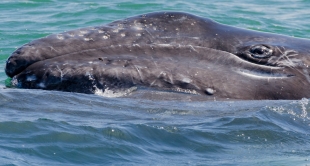Learning by mimicking is something we can see by observing our own children. Dolphins too, learn by mimicking. The interesting thing about mimicking is that it requires a large brain volume.
Dolphins in captivity tend to imitate e.g. divers cleaning their pools. There are many examples for mimicking behavior.
The scientist Diana Reiss reports a situation when she was “punished” by a bottlenose dolphin the way she always had “punished” the animal. When the dolphin didn`t react and executed her order the way she wanted it to. The “punishment” was to step back, lower her head and give the dolphin a “timeout”.
Usually the dolphin was allowed to choose one of three possible activities. When Diana Reiss made it impossible for the dolphin to choose the activity “fish”, it imitated “punishing” behavior and gave her a “timeout”, too.
In a dolphinarium in Adelaide, Australia, a wild bottlenose dolphin was admitted because it was unwell and seemed to be sick in some way.
Billie – that was her name – was coddled up for some weeks and then freed into the ocean. She did not take part in the trainings and shows like all the other dolphins, but she was only fed, treated and left alone.
When back in the ocean, Billie could be seen moving through the water tail walking. Nobody had taught her this, so she must have mimicked her fellows in the dolphinarium. 15 years later, scientists noticed that tail walking could be seen on other dolphins, too. So this behavior had been passed on to the next generation and formed some kind of culture. Tail walking dolphins are only known in this particular Australian area and the dolphins keep on teaching each other this behavior.
Another excellent example has been reported by the scientist Denise Herzing. On one of her study trips, a member of the crew had braided a crown out of seaweed, which he wore whenever he was on deck. At the end of the week, an Atlantic spotted dolphin showed up next to the boat – and he wore a seaweed-crown on his head!
These fascinating cetaceans don`t have hands to create things like we humans do – but their (social) intelligence and possibilities of perception are at least equivalent to ours.
How intelligent and wise would we be, if we preserved their wildlife habitat and if we would grant them the rights for freedom and personality!? The dignity of dolphins is untouchable, too!
Susanne Braack






